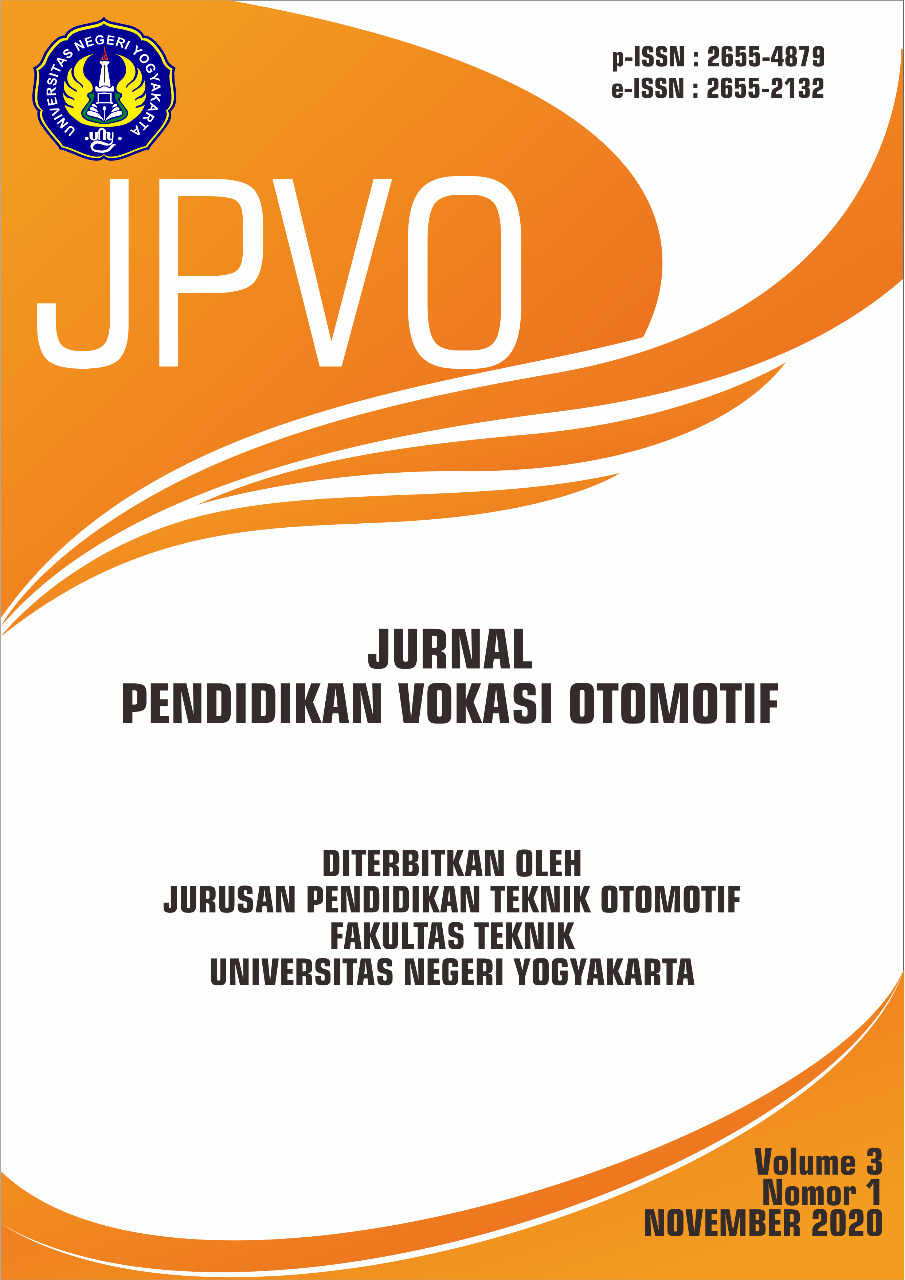PENGARUH TINGKAT PARTISIPASI DALAM MODEL PEMBELAJARAN PROJECT-BASED LEARNING TERHADAP KEMAMPUAN BERPIKIR KRITIS ANGGOTA TIM MOBIL GARUDA UNY
DOI:
https://doi.org/10.21831/jpvo.v6i1.67433Keywords:
Participation, Project-based Learning, Critical Thinking SkillsAbstract
Penelitian ini bertujuan untuk mengetahui pengaruh tingkat partisipasi dalam model pembelajaran Project-based Learning terhadap kemampuan berpikir kritis anggota Tim Garuda UNY. Penelitian ini merupakan penelitian kuantitatif ex pot facto, yang dilaksanakan di Fakultas Teknik Universitas Negeri Yogyakarta. Populasi penelitian terdiri dari mahasiswa anggota Tim Garuda UNY dan alumninya yang berjumlah 243 orang. Pengambilan data menggunakan metode survei dengan angket, observasi dan studi dokumentasi dengan jumlah sampel 75 orang dan menggunakan teknik simple random sampling. Teknik analisis data yang dilakukan dengan analisis deskriptif dan uji regresi sederhana. Hasil penelitian ini menunjukkan bahwa: (1) Pelaksanaan model pembelajaran Project-based Learning Tim Garuda UNY sesuai dengan indikator dan langkah model pembelajaran Project-based Learning. (2) Tingkat partisipasi anggota dalam mengikuti model pembelajaran Project Based Learning di Tim Garuda UNY berpengaruh terhadap kemampuan berpikir kritis anggota yang ditunjukkan dengan hasil uji T pada nilai signifikan 0,000 ˂ 0,05 dan t hitung 10,110 ˃ t tabel 1,993 dengan nilai koefisien determinasi yang didapatkan sebesar 58,3%.
Kata Kunci: Partisipasi, Project-based Learning, Kemampuan Berpikir Kritis
References
Angel, B. F. (2000). An evidence-based project for evaluating strategies to improve knowledge acquisition and critical-thinking performance in nursing students. Journal of Nursing Education, 39(5), 219–228.
Azzahra Rahma, Mia. (2020) Analisis Kemampuan Berpikir Kitis Matematis Siswa Melalui Model Project-based Learning. http://repository.unpas.ac.id/id/eprint/49804
Chankseliani, M., James Relly, S., & Laczik, A. (2016). Overcoming vocational prejudice: How can skills competitions improve the attractiveness of vocational education and training in the UK? British Educational Research Journal, 42(4), 582–599. https://doi.org/10.1002/berj.3218
Devlin-Scherer, N. B. (2010). Teacher Candidate Responses to Digital Games 21st-Century Skills Development. Journal of Research on Technology in Education Volume 42, 409-425.
Fadel, B. T. (2009). 21st Century Learning Skills. San Francisco: CA:John Wiley & Sons.
Flavell, J. H. (1979). Metacognition and cognitive monitoring: A new area of cognitive–developmental inquiry. American Psychologist, 34(10), 906–911.
Grant, M. (2002). Getting a Grip on Project-Based Learning : Theory, Cases and Recommendations. A Middle School Computer Technologies Journal.
Helakorpi, S. (2010) The philosophy behind vocational skills competitions, in: S. Kaloinen, P. Pynn€onen & H. Saarinen (Eds) Competitions for everyone (H€ameenlinna, Finland, HAMK University of Applied Sciences Vocational Teacher Education Unit).
James, S. & Holmes, C. (2012) Developing vocational excellence: Learning environments within work environments. SKOPE Working Paper No. 112, University of Oxford.
Jumhur, A. A., Avianti, R. A., & Akbar, A. T. (2021). Critical Thinking Based Interactive Learning Media for Basic Mechanical Engineering. Jurnal Pendidikan Teknologi Dan Kejuruan, 27(2), 146–156. https://doi.org/10.21831/jptk.v27i2.36583
Kemendikbud. (2017). Implementasi Pengembangan Kecakapan Abad 21 dalam Perencanaan Pelaksanaan Pembelajaran (RPP). Jakarta: Direktorat Pembinaan SMA Direktorat Jenderal Pendidikan Dasar dan Menengah Kementerian Pendidikan dan Kebudayaan 2017.
Kemendikbud, L. (2015, September 29). Kurikulum 2013: Pergeseran Paradigma Belajar Abad-21. Retrieved from Litbang Kemendikbud: http://litbang.kemendikbud.go.id/index.php/index-berita-kurikulum/243-kurikulum-2013-pergeseran-paradigma-belajar-abad-21
Kharisma, C. (2020). Meningkatkan Keaktifan dan Hasil Belajar Siswa SMK Piri Sleman Menggunakan Model Pembelajaran Jigsaw. Jurnal Pendidikan Vokasi Otomotif, Vol 3, Nomor 1, 47-63.
Mayhew, K., James, S., Chankseliani, M. & Laczic, A. (2013) Benefits of Developing Vocational Excellence. A Report to the National Apprenticeship Service. (Oxford, UK, University of Oxford) Available online at: http://www.findafuture.org.uk/media/1823/duve-project-3-final-reportphase-1.pdf/
Muhammad Kris Yuan Hidayatulloh, A. d. (2019). The Effect of Problem-based Learning and Blended Learning Model to Metacognitive Awareness as a Reflection Towards a New Normal Era. Jurnal Pendidikan Teknologi dan Kejuruan, Vol. 26, No. 2, 183-
Mutohhari, F. S. (2021). Difficulties in Implementing 21st Century Skills Competence in Vocational Education Learning. International Journal of Evaluation and Research in Education, 10(4), 1229–1236.
Rahardhian, A. (2022). Kajian Kemampuan Berpikir Kritis (Critical Thinking Skill) Dari Sudut Pandang Filsafat. Jurnal Filsafat Indonesia, 5(2), 87–94. https://doi.org/10.23887/jfi.v5i2.42092
Utama, K. O. D., & Sukaswanto, S. (2020). PENGARUH MODEL PEMBELAJARAN PROJECT BASED LEARNING TERHADAP HASIL BELAJAR DAN KEAKTIFAN BELAJAR SISWA DI SMK NEGERI 1 NGAWEN. Jurnal Pendidikan Vokasi Otomotif, 2(2), 79–92. https://doi.org/10.21831/jpvo.v2i2.33560.
Wang, S., Peng, F., & Feng, Z. (2023). The Role of Skills Competitions in Improving the Practical Ability of Vocational College Students. Journal of Contemporary Educational Research, 7(2), 23–28. https://doi.org/10.26689/jcer.v7i2.4708
Yuan, K., Aftoni, A., & í‡obanoÄŸlu, í–. (2020). The Effect of Problem-Based Learning Model and Blended Learning Model to Metacognitive Awareness as a Reflection Towards a New Normal Era. Jurnal Pendidikan Teknologi Dan Kejuruan, 26(2), 183–188. https://doi.org/10.21831/jptk.v26i2.32783
Downloads
Published
How to Cite
Issue
Section
Citation Check
License
Jurnal Pendidikan Vokasi Otomotif allows readers to read, download, copy, distribute, print, search, or link to the full texts of its articles and allow readers to use them for any other lawful purpose. The journal allows the author(s) to hold the copyright without restrictions. Finally, the journal allows the author(s) to retain publishing rights without restrictions

Jurnal Pendidikan Vokasi Otomotif is licensed under a Creative Commons Attribution-ShareAlike 4.0 International License.
Based on a work at https://journal.uny.ac.id/index.php/jpvo.









